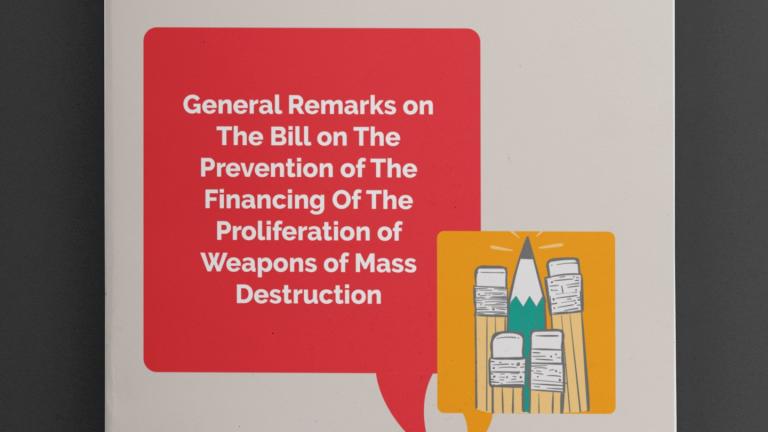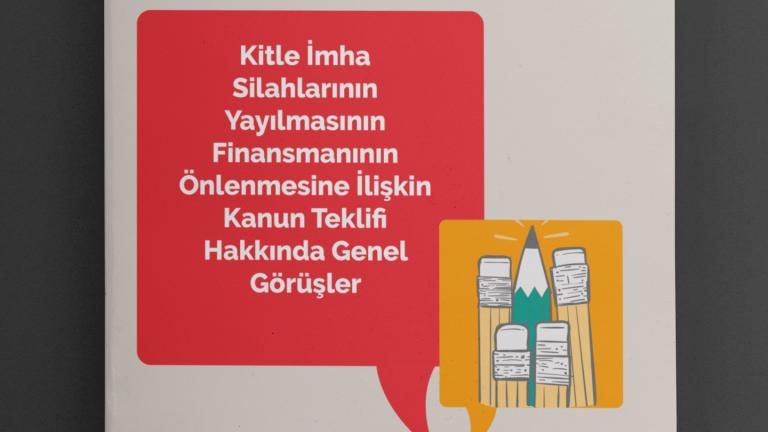
The "Draft Law on the Prevention of the Proliferation of Weapons of Mass Destruction", which came to the agenda of the Grand Assembly on December 16, 2020 and is closely related to civil society organizations, continues to be discussed. STGM's Executive Board made a statement regarding the relevant regulation.
While the stipulated changes in the legislation bring along concerns that the work of civil society organizations will be restricted, the STGM's Executive Board pointed out that although the name and the justification of the bill of law is presented as to prevent the proliferation of weapons of mass destruction and finance of terrorism, it rather foreseen regulations on the Law of Associations no.5253 and Law of Aid Collection no.2860.
While emphasizing in the statement that civil society organizations in Turkey, are subject to harsh audit and control rules compared to many countries in the world, stating that, proposed changes on Law of Associations no.5253 and Aid Collection Law no.2860, are incompatible with the justification of the legislative proposal and will produce more restrictions on fundamental rights and freedoms.
In the statement, "An inclusive consultation process should be initiated to review the changes to be made in both the Law on Associations and the Law on Aid Collection, in line with the 11th Plan decisions. Today, our country needs not to further restrict fundamental rights and freedoms, but to expand the scope of these freedoms in line with universal criteria. The Civil Society Development Center Association is ready to contribute to this process.
The statement made by the STGM's Executive Board is as follows:
"Draft Law on the Prevention of the Proliferation of Weapons of Mass Destruction" was submitted to the Presidency of the Turkish Parliamentary Speaker's Office on December 16, 2020, and was discussed and accepted in the Justice Commission, which is the main commission, on December 18 and 19, 2020.
Although the name and justification of the proposed law are presented as the proliferation of weapons of mass destruction and the prevention of terrorist financing, the proposal mostly envisages changes in the Associations Law No.5253 and the Aid Collection Law No. 2860.
Preventing the proliferation of weapons of mass destruction, eliminating money laundering crimes, and combating the financing of terrorism are among the important tasks that stand before all humanity today. It's clear that public institutions and private sector organizations can be abused in committing these crimes, as well as civil society organizations. As civil society organizations will be in favor of preventing this abuse, they are also open to making an active contribution to the struggle.
In this direction, there is no discussion about the necessity of taking into account the recommendations of the FATF (Financial Action Task Force), which was established by the G-7 countries as an intergovernmental forum, concerning civil society organizations and carrying out the necessary studies. Because in 2019, T.C. The Treasury and Finance Ministry's Financial Crimes Investigation Board has published a “Guide for the Prevention of Abuse of Non-Profit Organizations for Financing Terrorism” to inform them on terrorism and terrorist financing issues and to raise their awareness and awareness of the issue.
In the justification of the law in question, the purpose of the regulations made is based on the 8th recommendation of the FATF, which envisages the review of the regulations regarding civil society organizations. However, the recommendations of the FATF do not oblige the regulations to be made. To give an example, let's leave alone the abnormal strict regulations in the proposal, the fundraising activities in Finland, which is a FATF member, are not even subject to permission up to 20 thousand Euros per year, and yet Finland is not considered a risky country according to the FATF. Therefore, it is not possible to associate the proposal, which envisages adding severe criminal and administrative sanctions to the aid collection legislation, which already contains heavy bureaucratic conditions, with the recommendations of the FATF.
Moreover, FATF itself does not claim that civil society organizations are particularly weak in financing terrorism and states that there should not be a single rule to be applied to all civil society organizations.
In our country, civil society organizations are subject to more severe control and control rules compared to many countries in the world. As exemplified above, our country is not in a weakness in this respect. On the contrary, with the bill of law, amendments proposed to Associations Law No.5253 and the Aid Collection Law No.2860, which are incompatible with the justification of the proposal and that will cause more restrictions on fundamental rights and freedoms. These changes are not necessary from the FATF recommendations and conflict with basic universal principles of freedom of association.
In particular, with the article 30 / A to be added to the Law of Associations, in the case of an investigation is initiated against those who work in the organs other than the general assembly of the association or the relevant personnel, paving the way of these persons or the organs where these persons work at may be suspended by the Ministry of Internal Affairs as a temporary measure, when considering investigations opened in our country may long for years, imposes restrictions that are even exceeding the permitted framework of an ordinary period of time when extraordinary administrative procedures implemented on freedom of association.
The articles that constitute the second part of the proposal and especially foreseeing changes in the Law of Associations and Aid Collection should be removed from the subject bill of law.
As it is known, the 11th Development Plan envisages an inclusive framework arrangement in line with the main objective of "the development of civil society awareness, the strengthening of organized civil society, the transparency and accountability of CSOs, and the effective participation of the state in decision-making processes" (776.1.) Also, “studies that will increase the participation and effectiveness of CSOs in decision-making and legislation preparation processes” are among the plan decisions. On the other hand, the Ministry of Internal Affairs General Directorate of Civil Society Relations continues its preparatory work for the "Civil Society Strategy Document and Action Plan" covering the period 2021-2025. In this context, the first Civil Society Advisory Council was held on 27 November 2020 in Ankara. An inclusive consultation process should be initiated to be reviewed in line with the 11th Plan decisions in both the Associations Law and the Aid Collection Law. Today, our country does not need to further restrict fundamental rights and freedoms, but to expand the scope of these freedoms under universal values. The STGM is ready to contribute to this process.



